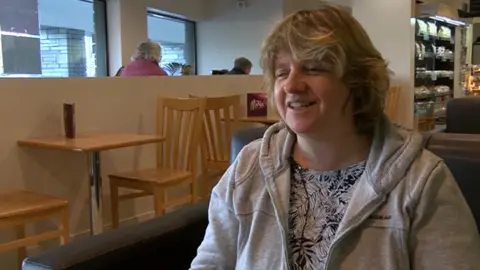Stereotyping 'blocks' disabled people from politics in Wales
 BBC
BBCDisabled people are being blocked from politics in Wales due to "negative, archaic stereotyping" and inaccessible buildings, campaigners have said.
An estimated 20% of the population are disabled, but only 1.5% of councillors are known to have a disability.
Disability Wales said more should be done to remove barriers to people standing to improve representation.
The Welsh Government said it was committed to tackling under-representation in public life.
Disability Wales said about 600,000 people in Wales have a disability, but very few councils hold data on how many councillors are disabled.
BBC research showed of the 1,254 councillors elected in May, just 19 are known by local authorities to be living with an impairment or long-term health condition.
Anita Davies, a councillor for Coity Higher Community Council in Bridgend, is registered blind and said people often made prejudgements on her ability to do her job.
She said she had sat in meetings where no-one introduced themselves or read out presentations, and she had not been sent important documents in the right format to make a decision.
"If I've got my cane with me and I'm on my own, some people will actually avoid talking to me because they are not quite sure what to say or how to introduce themselves," she said.
"[If I'm with a resident at a meeting] sometimes they think I'm a relative... the last thing they would have thought of is that I may be a councillor, because I have a visual impairment."
Conservative AM for north Wales, Mark Isherwood, who is partially deaf and chairman of the assembly's group on disability, said he purposely wore large standard NHS hearing aids so people could see.
"When my hearing started deteriorating I was the last person to admit it, I had a bit of an experience where people assumed I was stupid," he said, "I now wear it to make a statement, I am deaf but I am proud of it."
Disability Wales said people were being barred from accessing democracy due to meetings often being held in buildings which lack hearing loops or ramps.
Council chambers such as City Hall in Cardiff are listed buildings and are difficult to adapt for people with mobility issues, but many councils said they had improved facilities and provided support to help accessibility.
A Disability Wales spokeswoman said: "Disabled people are being prevented from entering public life due to negative, archaic stereotyping by members of the public.
"We are perceived as not being fit for the job due to having an impairment or health condition. In fact, these lived experiences bring us vital qualities needed for public life; empathy, problem solving and objectivity."
The organisation called for the Welsh Government to introduce a version of the Access to Elected Office Fund - introduced in Scotland for the local elections in 2017 - to help disabled people who want to stand for election with the costs.
A Welsh Government spokesman said: "While the Access to Elected Office Fund did not extend to Welsh elections, we are currently considering options for establishing a similar fund for Wales as part of our ongoing work to promote diversity amongst elected members."
